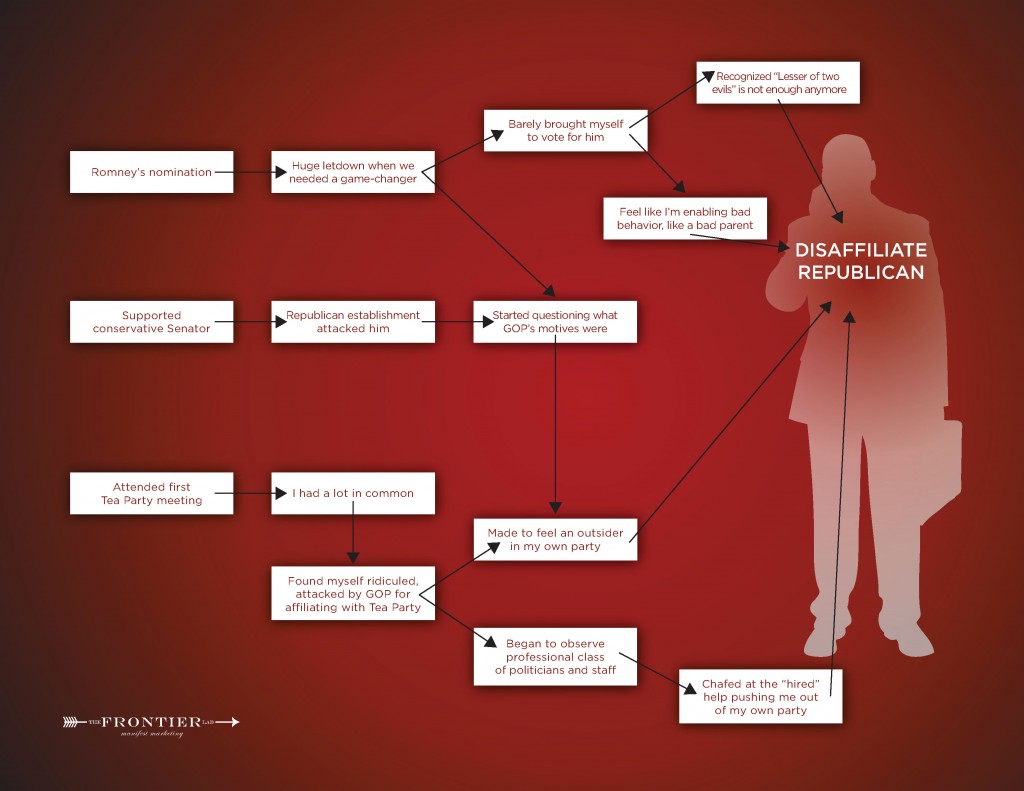This week, The Frontier Lab published the results of months of research into why some Republicans are refusing to go by the label “Republican,” choosing to identify as anything but. I was the Research Director for this study, which applied a research approach called “Behavioral Event Modeling,” which essentially reverse engineers and maps all events that precede an individual’s disaffiliation.
In the spring of 2013 the Republican National Committee released a report, the “Growth and Opportunity Project,” providing an assessment of the state of their party that began by stating that it was “time for the Party to learn once again how to appeal to more people.”
What this report failed to do, and “Switching Behavior” seeks to address, is the generation of meaningful insights about how the Republican Party’s adherents are interacting with the brand as it stands. No matter what outreach the RNC recommends to various segmented groups, if they do not address the four insights revealed by “Switching Behavior,” their cause will be a hopeless one.
The results were fascinating; after combining the flowcharts from individuals who share conservative or moderate views and no longer will use the label “Republican” to describe themselves, we ascertained four core patterns that they had in common:
- Rejection of the “Lesser of Two Evils” argument;
- Articulation of “Loss of Hope” in the GOP;
- Affiliation with a new community, and
- Incident of perceived betrayal by the GOP establishment.
What you don’t see here is that policy differences lead the way in disaffiliation. They’re there, to be sure, most prominently captured by those who lost hope after witnessing the GOP continually nominate candidates they perceived to be weak, too moderate, or too conservative. But patterns stemming from the realization that a “lesser of two evils” argument, put forth by the GOP to encourage support of a candidate, is no longer acceptable, is a strong indicator of future disaffiliation.
Here’s an example of how an individual disaffiliated from the Republican label (click to enlarge):
This individual began to question the Republican Party after having seen the candidate he supported attacked by members of the Republican establishment. At the same time, he felt “let down” after seeing Mitt Romney chosen as the 2012 nominee for President. Both of these preceding an event, the questioning of the GOP’s motives, which ultimately led to feelings of exclusion and the critical incident, disaffiliation. Concurrently, the event of affiliation with a new community, in this case the Tea Party, was identified as another path to disaffiliation.
Disaffiliation from the Republican label is not only, or even primarily, a matter of philosophical differences. Rather, the perception of former Republican adherents that their party has personally attacked them, continued to present choices as a “lesser of two evils,” select candidates and principles unpalatable to voters to the point where they retain “no hope,” and failed to provide the sense of community that other outlets like talk radio and the Tea Party provide, reveal that ideology takes a back burner to what is essentially a hollow brand for those disaffiliating.
There are two ways to use this research: 1, attempt to stem the disaffiliation — and this research suggests there are meaningful interventions stewards of the Republican brand could pursue. How simple for the RNC to, for example, revisit and halt any actions that publicly humiliate, discredit, or undermine candidates eagerly supported by various factions of their party. Guidelines to representatives of the party on cable news, for example, ought to include such caveats.
2, use these insights to encourage disaffiliation. Realize that the cultivation of community outside of the Republican Party has strongly influenced disaffiliation. The Frontier Lab put together a series of “interventions” pursuant to both applications available for download here.
Have you experienced any of these events in your “career” as a Republican? Vote in TFL’s facebook poll here.
 DONATE
DONATE
Donations tax deductible
to the full extent allowed by law.








